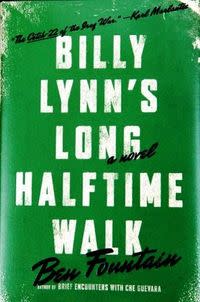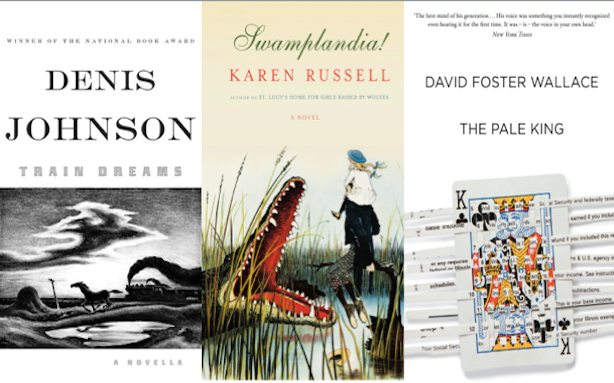We Need a Fiction Pulitzer in 2013
In mid-April of 2012 the book publishing world was left reeling when it was announced that for the first time since 1977, no Pulitzer Prize for Fiction would be awarded. This news came as a surprise not only to the book-reading public, but also to the three jurors who had devoted much time and energy to narrowing down the three finalists they felt most deserved perhaps the biggest honor in all of American letters. Now, in the comprehensive listing of Pulitzers awarded in years past, there is and forever will be the notation "No award" for 2012.
RELATED: Where Would Hemingway Stay?; Amazon's Faux Bestseller Problem
Below that, a kind of insult added to injury, are the titles and authors of the books that NPR book critic Maureen Corrigan, The Hours's Pulitzer-winning author Michael Cunningham, and former books editor Susan Larson, who now hosts NPR's "The Reading Life," had chosen as finalists after reading some 300 novels in six months, only to be snubbed by the final Pulitzer board. Those books were Denis Johnson's Train Dreams, Karen Russell's Swamplandia!, and David Foster Wallace's The Pale King—three highly acclaimed, widely praised works, none of which, for some reason or another, would ever be deemed the winner.
RELATED: The Censorship of a Book About Two Moms; Israel Battles Book Discounts
As we wait for this afternoon's announcement from the Pulitzer board that will, we hope, bring a fiction award-winner, what happened last year looms in the background. As Julie Bosman writes in The New York Times, the fiction snub left "authors, publishers and retailers fuming at the missed opportunity for buzz, sales and exposure, and chafing at the perceived blow to literature’s prestige."
RELATED: 'The Hunger Games' Breaks the Potter Book Barrier on Amazon
It was inconceivable then to the jurors (and surely to the authors, and to quite a lot of readers) that the board would decide not to award a winner from among the numerous great books that year. It was further inconceivable, particularly in an age in which information is king, that the public will never really know what exactly happened, or why it went the way it did. The jurors themselves don't even know, and would never be given those answers. In the days and weeks that followed the (non-)announcement, they—understandably confused and angry—revealed how they felt about the slight. Cunningham contributed an insightful two-part piece to the New Yorker's website. And Corrigan took to the Washington Post to discuss flaws in the process, writing, "That terrible news capped what was otherwise the greatest honor of my career as a book critic and professor of literature." She offered some possible fixes to the problem: add a person to the 18-member board to eliminate ties; do away with the requirement of an agreement by plurality and make the choice based on a simple majority; and/or give the three jurors the final decision (or the chance to put forth alternative suggestions) if necessary.
RELATED: A New Discussion of 'Skinny' for Teens
When I spoke to Corrigan a few months after the announcement, she was still hurt by the 2012 Pulitzer decision, not only for herself and her fellow jurors, but also for the message the lack of award gave about the writing of the year: "Of course I was angry about the work I did, but also about the novels. The impression it gives is that they aren't up to snuff."
RELATED: Richard Ben Cramer Was Sued by His Publisher While He Battled Lung Cancer
I reached out to her again this week to see how she, surely reliving 2012, felt on the eve of this year's announcement. (This year's jurors will be revealed at 3 p.m. Eastern today along with the finalists and a potential winner.) Corrigan told me, "It was a terrible day last year. I think my fellow judges and I are cautiously optimistic that the board will complete its job this year; otherwise we probably all wish the Pulitzer anniversary speeds by as quickly and painlessly as possible. It's so crucial that extraordinary writing be recognized and brought to the attention of a wider audience and prizes like the Pulitzer can do that."
There were a couple of high points to hang onto, though. As much as she still feels disappointed and confused about the failure to choose a winner, the reading experience itself was wonderful, Corrigan explained, the sort of thing she'd yearned for in grad school, "like being in the most intense and tiniest book club," she said. "We did clash and argue, but God, we took it seriously. That's the part of the process that really made me angry. We heard when everyone else did that there would be no prize, and that there would be no explanation. I think if you don't give out the prize, you have to give a reason."
And particularly in these viral Internet times, there may be something to be said for press, even if it's not the sort one might have planned or hoped for. Following the news, Corrigan said, "What we did hear was that the sales of all three books had risen dramatically. Bookscan numbers for Train Dreams had shot up; it certainly got people talking about the books."
For the good and the bad, the experience will never be forgotten, and it's something that sets three truly dedicated book lovers apart from the rest of the reading public, professionals and amateurs included. Corrigan told me, "Michael Cunningham, Susan Larson, and I were reunited a few weeks ago at the Tennessee Williams Festival in New Orleans. We had a wonderful dinner together: lots of laughter, gossip, book talk and drinks. We are bonded in blood."
So, what will happen this year? As in 2012, there are plenty of contenders, numerous deserving books. A short-list of rumored or imagined possible finalists swirls. Will it be the National Book Award-winning The Round House by Louise Erdrich? Michael Chabon's Telegraph Avenue? This Is How You Lose Her by Junot Diaz (a winner for Oscar Wao who himself now sits on the Pulitzer board)? Impressive offerings by Jess Walter, Nathan Englander, Lauren Groff, or Dave Eggers? In a twist, maybe Chris Ware's utterly unique graphic novel Building Stories? Or the book that seems to be the front-runner in the circles that discuss such things, Billy Lynn’s Long Halftime Walk by Ben Fountain?
In the excitement and the possibilities, it's hard to completely forget about what happened last year, and what could happen again. Sig Gissler, the administrator of the Pulitzers for Columbia University, told the Times's Bosman, "it was not impossible that a Pulitzer board would decline to award a prize in a category two years in a row."
For some of us, last year's wounds remain more raw than for others. "You've got novels that transport you to another place and they do so in language that’s enlightening and surprising," Corrigan told me in 2012. "There are these miracles that happen every year." Let's hope the Pulitzer board sees fit to give the award to one of them today.


